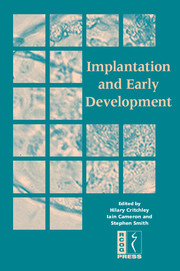Preface
Published online by Cambridge University Press: 05 June 2014
Summary
Successful implantation and early development require a union of healthy gametes and subsequent growth and development within an optimal uterine environment. The 48th RCOG Study Group comprised a national and international multidisciplinary expert forum that considered factors involved in preparation for implantation within the uterus, what makes a good egg and good sperm and hence a good embryo. Lessons from animal models and transgenic and genomic technologies received consideration. Attention was given to both sporadic and recurrent early pregnancy loss and to the scale of these distressing events. New treatment options were critically discussed and empirical approaches to management, without evidence of identifiable aetiological factors and rigorous evaluation, were cautioned against.
Assisted reproductive technologies have had a huge impact on the management of fertility problems over the past 25 years. Discussion included the arguments for singleembryo transfer and the developmental consequences of assisted reproductive technologies. The Group emphasised the need to continue to extend and refine the evidence base available for investigation and treatment options across the spectrum of early pregnancy management.
The ‘consensus views’ contained within this publication are not formal recommendations, but the conclusions of independent experts. Areas where future research is much needed have been identified. Emphasis is given to the multidisciplinary approach required if there is to be a substantial impact on our knowledge base, whether biological or clinical.The chapters herein have provided the authors with the opportunity to express further their individual views and to discuss issues in more detail and depth. We hope that this publication will provide a valuable resource for gynaecologists, specialist nurses, embryologists, basic scientists and all those with an interest in early pregnancy and development.
- Type
- Chapter
- Information
- Implantation and Early Development , pp. xv - xviPublisher: Cambridge University PressPrint publication year: 2005

